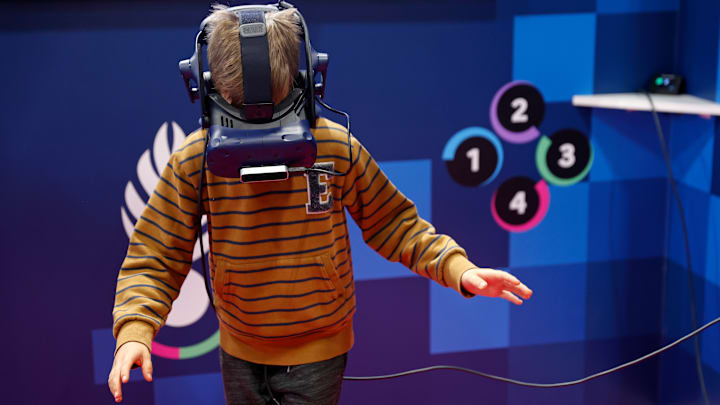How Is Virtual Reality Transforming the Gaming Industry?

Virtual Reality and Gaming: A New Dimension of Entertainment
Virtual Reality (VR) is revolutionizing the gaming industry, offering immersive, interactive experiences that were once confined to the realm of science fiction. By transporting players into lifelike digital worlds, VR has redefined how games are played, developed, and perceived. From enhanced gameplay mechanics to fostering new social interactions, VR is transforming gaming in profound ways.
1. Immersive Gameplay Experiences
What VR Offers:
VR technology places players directly into the game environment, making them active participants rather than passive players. With motion tracking and 360-degree visuals, players can explore virtual worlds as if they were physically present.
Impact:
- Enhanced Realism: Games like Half-Life: Alyx offer detailed, interactive environments where players can manipulate objects naturally.
- Emotional Engagement: The sense of presence in VR makes narratives more compelling and impactful.
- Improved Mechanics: VR controllers and haptic feedback create intuitive gameplay, such as wielding a sword or shooting a bow.
2. Innovative Game Design
What VR Offers:
Developers are creating games specifically for VR platforms, leading to unique mechanics and storytelling methods tailored to the medium.
Impact:
- Room-Scale Interaction: Titles like Beat Saber and Superhot VR incorporate full-body movement into gameplay.
- Creative Freedom: VR encourages experimentation, resulting in genres like VR puzzle-solving (I Expect You To Die) or collaborative escape rooms.
- Emerging Genres: Games blend traditional elements with VR-specific mechanics, creating new hybrid genres.
3. Social Gaming Redefined
What VR Offers:
VR supports multiplayer platforms where players can interact in virtual spaces using avatars, mimicking real-world gestures and expressions.
Impact:
- Social VR Platforms: Applications like VRChat and Rec Room foster virtual communities, allowing players to socialize, collaborate, and play games together.
- Enhanced Team Play: Cooperative VR games, such as Arizona Sunshine, create immersive multiplayer experiences.
- Breaking Geographic Barriers: Friends and players from around the world can gather in shared virtual environments.
4. Physical Engagement in Gaming
What VR Offers:
Unlike traditional gaming, VR often requires physical movement, turning gameplay into an active experience.
Impact:
- Fitness Integration: Games like FitXR and BoxVR combine gaming with exercise, appealing to health-conscious players.
- Accessibility: VR can be adapted for players with mobility limitations, offering customized experiences.
- Redefining Gaming Spaces: Players use their living rooms as interactive environments, blending physical and digital worlds.
5. Advancement of Esports and Competitive Gaming
What VR Offers:
VR is carving its niche in the esports industry with games designed for competitive play.
Impact:
- New Tournaments: VR esports events, such as Echo VR competitions, are gaining popularity.
- Player Skills: VR requires both digital strategy and physical coordination, broadening the scope of competitive gaming.
- Audience Engagement: Spectators can watch matches from a VR perspective, increasing immersion in esports events.
6. Enhanced Accessibility Through VR
What VR Offers:
VR platforms are developing tools to accommodate diverse player needs, making gaming more inclusive.
Impact:
- Adaptive Controllers: Devices like the Oculus Touch offer customizable controls for players with disabilities.
- Expanding Player Base: VR broadens gaming’s appeal by offering experiences that cater to non-traditional gamers, such as educational and therapeutic games.
7. Pioneering Hardware and Software Development
What VR Offers:
The gaming industry’s push for VR has spurred advancements in both hardware and software technologies.
Impact:
- Hardware Evolution: Devices like the Meta Quest 3, PlayStation VR2, and HTC Vive offer improved graphics, motion tracking, and affordability.
- Game Engines: Platforms like Unity and Unreal Engine provide powerful tools for developing immersive VR games.
- Accessories: Innovations such as haptic suits, treadmills, and hand-tracking enhance the VR experience.
8. Broadening the Market
What VR Offers:
VR is no longer niche—it’s reaching mainstream audiences through affordable devices and accessible games.
Impact:
- Cross-Platform Play: Many VR games are available across multiple platforms, attracting diverse audiences.
- Casual Gamers: Simple, engaging titles like Job Simulator or Moss appeal to non-gamers, broadening the market.
- Global Reach: The growing adoption of VR in emerging markets expands the industry’s reach.
Challenges and Limitations
While VR offers exciting opportunities, it faces challenges:
- Cost: High-quality VR systems can be expensive, limiting access for some players.
- Motion Sickness: Some players experience discomfort during VR gameplay due to visual discrepancies.
- Content Development: VR game development is resource-intensive, making it harder for smaller studios to compete.
- Space Requirements: Room-scale VR demands physical space, which may not be available to all users.
The Future of VR in Gaming
The trajectory of VR in gaming points toward even greater innovation:
- Cloud VR: Streaming technology will make high-quality VR accessible without expensive hardware.
- AI Integration: Smarter NPCs and dynamic storytelling will make VR worlds more engaging.
- Mixed Reality (MR): Combining VR with augmented reality (AR) will blur the lines between virtual and real-world gaming.
- Persistent Virtual Worlds: Expanding metaverse platforms will create interconnected gaming universes.
Conclusion: Gaming in the VR Era
Virtual reality is redefining the gaming industry, offering immersive experiences that push the boundaries of creativity and interaction. While challenges remain, the rapid pace of innovation suggests a future where VR becomes an integral part of mainstream gaming. For players, developers, and the industry as a whole, VR represents not just a new way to play, but a transformative evolution of what gaming can be.